SB Television
Scores Compress After Race-Packed Day In Marblehead
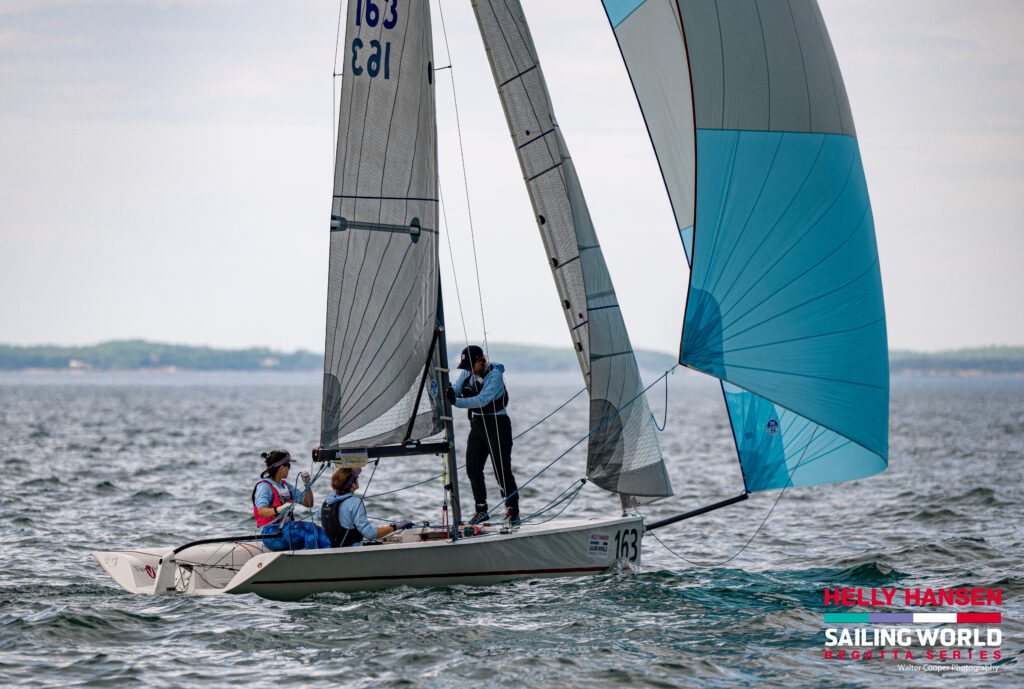 Kaila Pfang, Liz Obermaier and John Ped use their improved downwind speed to put two race wins on the board on the second day of racing in Marblehead.
Walter Cooper
Kaila Pfang, Liz Obermaier and John Ped use their improved downwind speed to put two race wins on the board on the second day of racing in Marblehead.
Walter Cooper
Kaila Pfrang and her teammates, Liz Obermaier and John Ped, were the last of the Viper 640s to return to the dock after the second day of racing at the Helly Hansen Sailing World Regatta Series at Marblehead Race Week.
Given they’d won the final race of the day, they should have also won the race to the haul-out crane, but with ideal sailing conditions capping a full day of racing, they instead put in a solid hour of practice. Relatively new to the class and keen to be up to speed for the coming Viper 640 North American Championships in their home waters of Hampton, Virginia, time in the boat, Pfrang says, is essential.
For Pfrang and her Slippery Salmon crew, today’s racing was indeed time well spent and represented a turning point after struggling to find their rhythm on the first day.
.embed-container { position: relative; padding-bottom: 56.25%; height: 0; overflow: hidden; max-width: 100%; } .embed-container iframe, .embed-container object, .embed-container embed { position: absolute; top: 0; left: 0; width: 100%; height: 100%; }“Yesterday definitely felt like we didn’t quite figure out the conditions,” Pfrang says. “Today felt a lot more like we were finally learning how to go fast.”A former MIT sailor, Pfrang attributed the team’s improvements to finding the boat’s lower and faster groove, rather than pinching too high, a habit carried over from college sailing.
Their results today—two race wins and a seventh that resulted from an OCS start—were dramatic improvements from yesterday’s mid-fleet finishes. The team’s commitment to maximizing their time on the water was evident. They arrived an hour early before racing and stayed out long after other competitors had headed for the docks. “Time on the boat, time on the water, time racing,” Pfrang emphasized as their approach for improvement.
 Peter Shumaker, Luke Lawrence and Josh Revkyn out front of the Etchells fleet.
Walter Cooper
Peter Shumaker, Luke Lawrence and Josh Revkyn out front of the Etchells fleet.
Walter Cooper
Their success today also hinged on more aggressive starts and better teamwork as well. “The two races that we won, we had awesome starts,” Pfrang says. “I mean, I think that was a huge difference from yesterday. I was under the line on both the previous starts, and this time, I felt like we were a lot more aggressive.”
With clear air off the start, they could execute their own decisions rather than being forced to react.
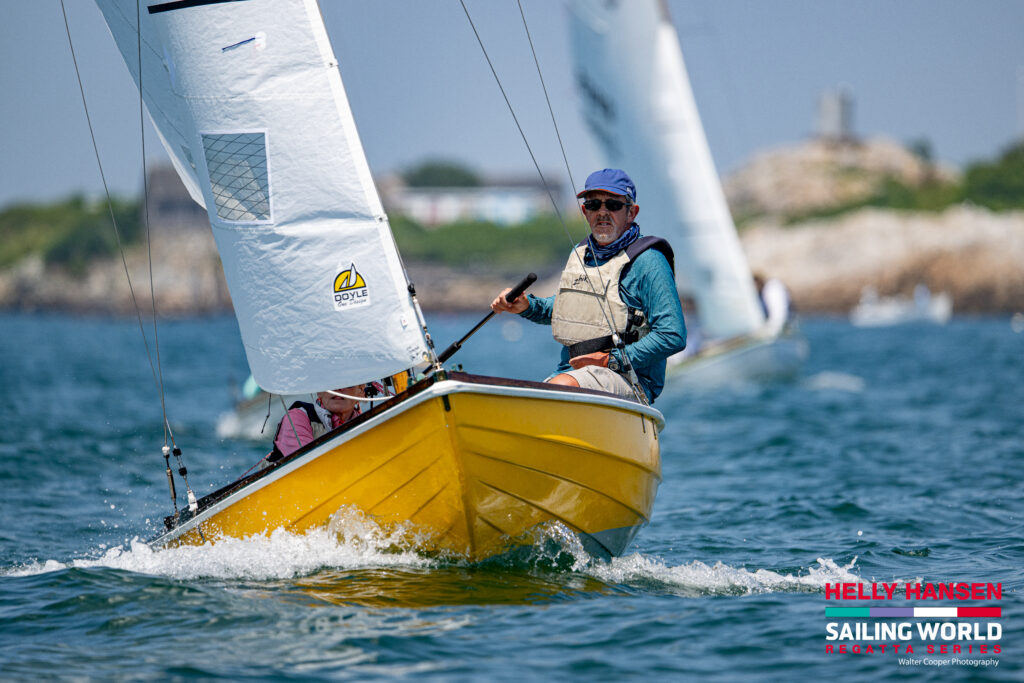 Nick Cann and crew Andrea Dodge keep pace in their Town Class on a three-race-win day.
Walter Cooper
Nick Cann and crew Andrea Dodge keep pace in their Town Class on a three-race-win day.
Walter Cooper
Their downwind speed also proved decisive. When asked about their effective low-mode sailing downwind, Pfrang described a coordinated effort: “Liz is really focusing on where the breeze is, John is really focused on the feel of the spinnaker and a little bit of the waves, and I’m just really tuned into one little corner at the front of the boat and how the tiller feels.”
Their results advanced them to fourth overall, within striking distance of the class leaders. There’s only 4 points between them with plenty more racing on tap for the final day. Henry Amthor’s team on E+A2 is atop the fleet with 17 points to the Silly Salmon’s 24.
Meanwhile, Peter Shumaker and his team posted a commanding 2-2-1-3 for the day in the Etchells class, creating a substantial lead over Ben Wilkins’ team. Shumaker simply attributed their performance to superior boat speed and crew work. “I don’t think there was anybody on the racecourse that was faster than us today,” he says. “We just went straight, and the boat basically went higher and faster than anybody else around us.”
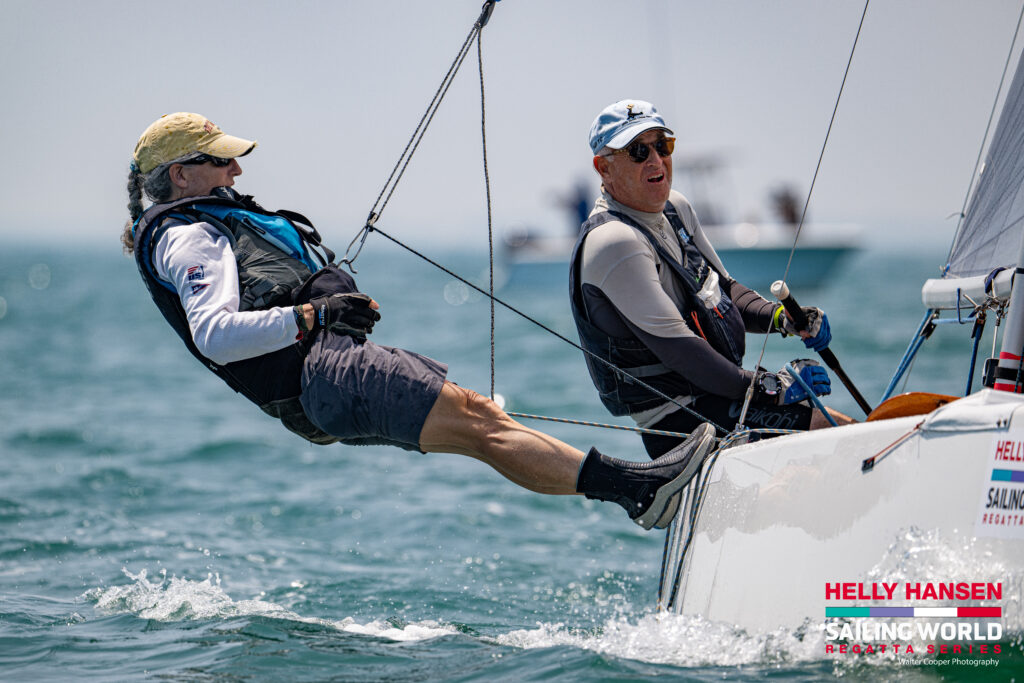 Joe Berkeley and Linda Epstein in fine form for three race wins in the International 110 fleet.
Walter Cooper
Joe Berkeley and Linda Epstein in fine form for three race wins in the International 110 fleet.
Walter Cooper
Alongside crew Luke Lawrence and Josh Revkin, the team executed a patient starting strategy that paid dividends in every race.
“We laid back a little bit from the line because the Etchells carries a lot of momentum. It’s hard to slow down,” Shumaker says. This approach allowed them to identify which side of the course they preferred and position accordingly.
Their tactics proved particularly effective in the last race. “We started at the committee boat, went right, the wind went right, and we had a 300-yard lead on the next boat,” Shumaker says. The team’s ability to minimize tacks while maintaining clear air created an insurmountable advantage—“the rich get richer,” as Shumaker puts it.
In the Town Class, Nick Cann executed a near-perfect day, including victories in the final three races. Using a college-style 3-minute sequence and shorter courses, the race committee pushed through an impressive six races.
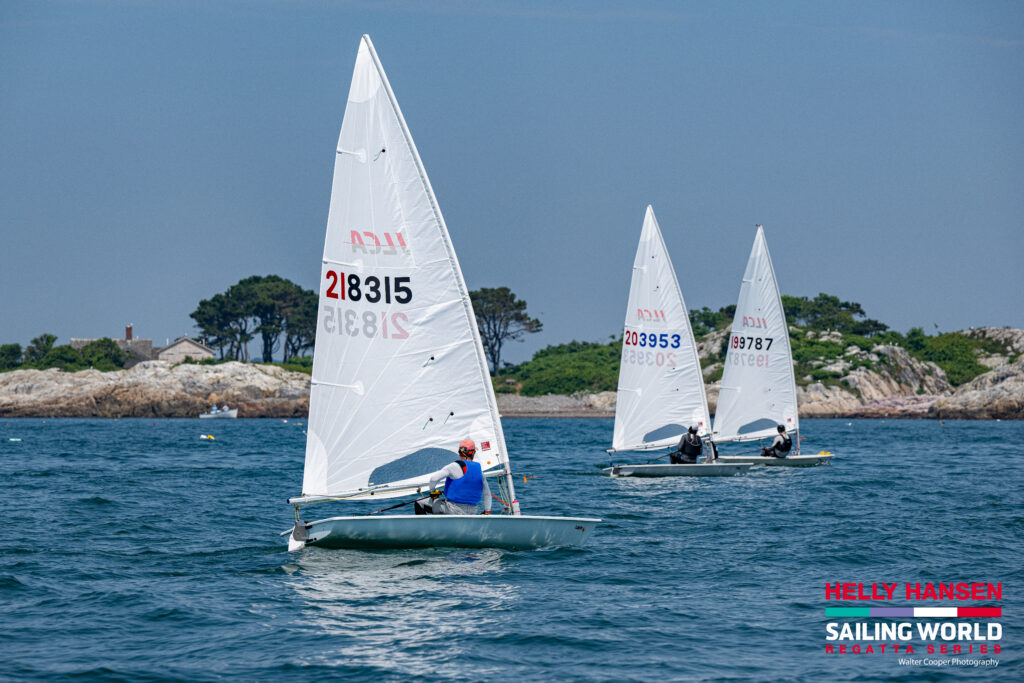 ILCA7 sails work their way upwind on the first day of their series.
Walter Cooper
ILCA7 sails work their way upwind on the first day of their series.
Walter Cooper
“I was kind of chasing pressure today,” Cann says. “I was planning on going right because I was expecting the wind to slowly clock to the right.”
However, he found more pressure on the left side of the racecourse, toward the eastern part of Children’s Island and adjusted his strategy accordingly. “Once I got into a groove, I kept doing the same thing—trying to get a good start, get clear air, and bang over to Children’s Island.”
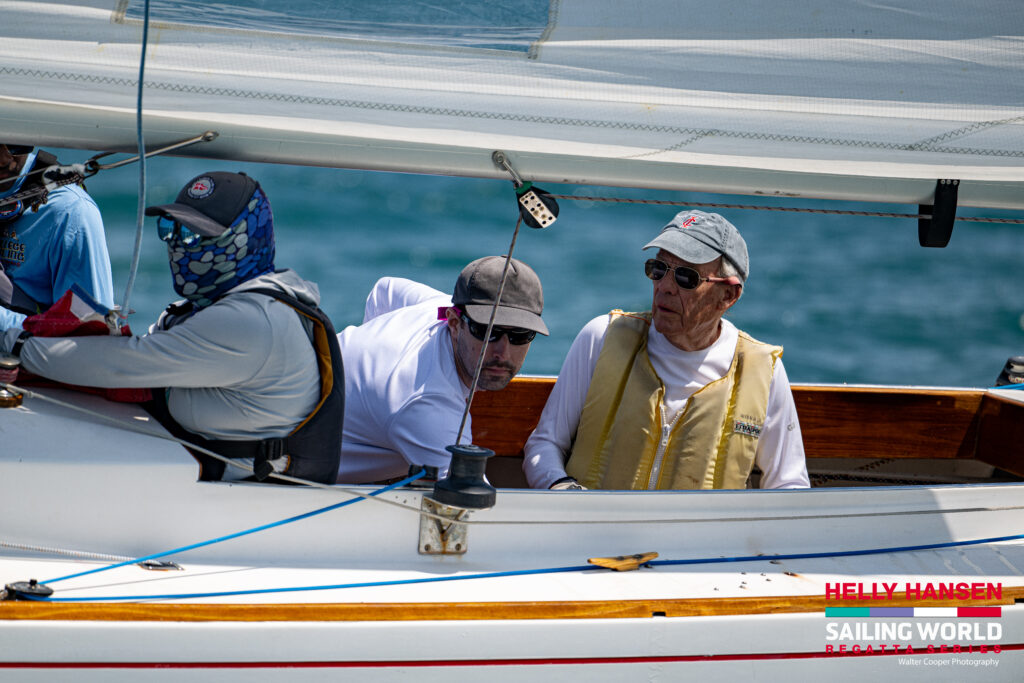 IOD champion Bill Widnall finds himself fending the charge of rivals on Carolyn Corbet’s Elektra.
Walter Cooper
IOD champion Bill Widnall finds himself fending the charge of rivals on Carolyn Corbet’s Elektra.
Walter Cooper
Sailing with his partner Andrea, Cann was fast in the choppy conditions created by the sunny summer weekend’s heavy power boat traffic. His successful technique, he says, was easing the luff tension on both main and jib. “I had relatively baggy sails today by my standards,” he says. “Kind of power through the chop was my philosophy.”
Despite their seemingly easy wins, Cann remained wary of his close competitors Molly and Tom Bushman. “They just wouldn’t go away,” he says. “They were buried in the fleet at one point, down in fourth or fifth, and I turn around and there they are right behind me.”
This pressure forced Cann to stick to covering tactics whenever possible.
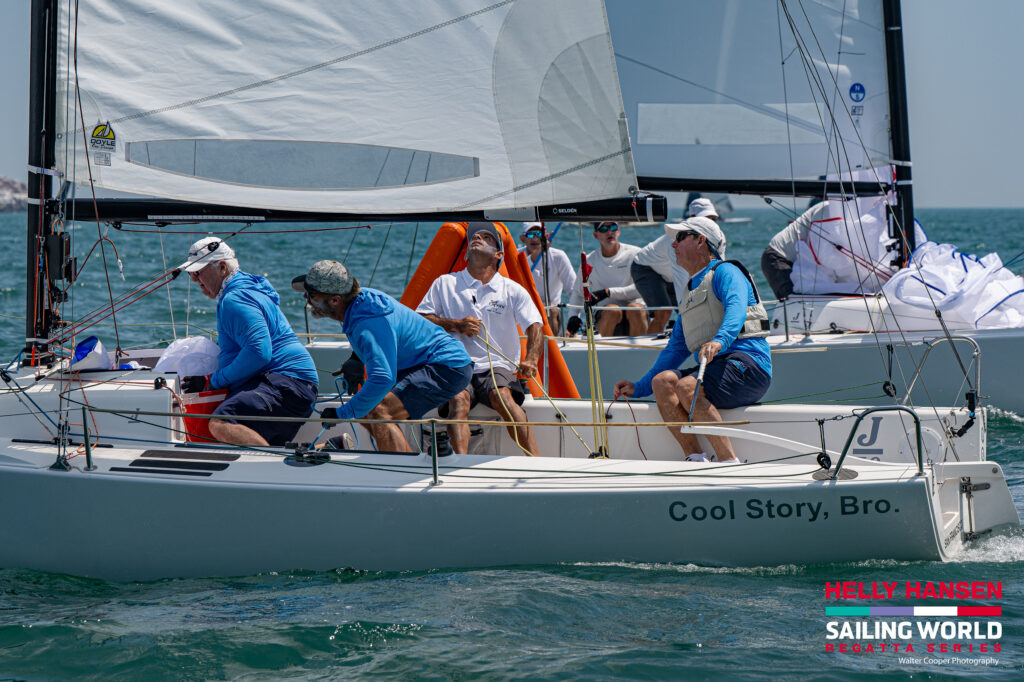 Peter Duncan’s Relative Obscurity exits a crowded mark rounding.
Walter Cooper
Peter Duncan’s Relative Obscurity exits a crowded mark rounding.
Walter Cooper
With a stronger breeze forecast for tomorrow, Cann expressed slight concern about his team’s lighter weight. “Andrea is like 110 pounds soaking wet, and I’m not terribly heavy,” he says. Nevertheless, their consistent performance has put them in an excellent position heading into the final races.
Sharing the same racecourse as the Town class, the regatta’s dozen ILCA7 sailors took to the water for their first day of racing. Nicolas Regnault won four of seven races to step out to a 4-point lead over Stein Skaame, who won a pair of races himself.
The ever-competitive IOD fleet has local legend Bill Widnall atop the standings by a single point over Carolyn Corbet’s Elektra. These two teams enjoyed an identical battle in 2024 with Widnall’s Javelin winning the series by a point on the final day.
 Nat and Jim Taylor, leaders of the Rhodes 19s after three days of racing.
Walter Cooper
Nat and Jim Taylor, leaders of the Rhodes 19s after three days of racing.
Walter Cooper
Peter Duncan’s J/70 Relative Obscurity padded its lead over Bruno Pasquinelli’s Stampede with top-three finishes on a day that saw plenty of crowded starts and mark roundings—standard fare for this pro-laden class that will be contesting its Corinthian Championship in Marblehead this fall.
In the Lightning class, Connor Godfrey, John Ring and Kim Rosell went on tear, winning two races and finishing second in two others to advance to the top of the scoreboard. Brad Tindall and Greg Turman’s J/105 TnT padded their lead by another point over Charlie Garrard’s Merlin.
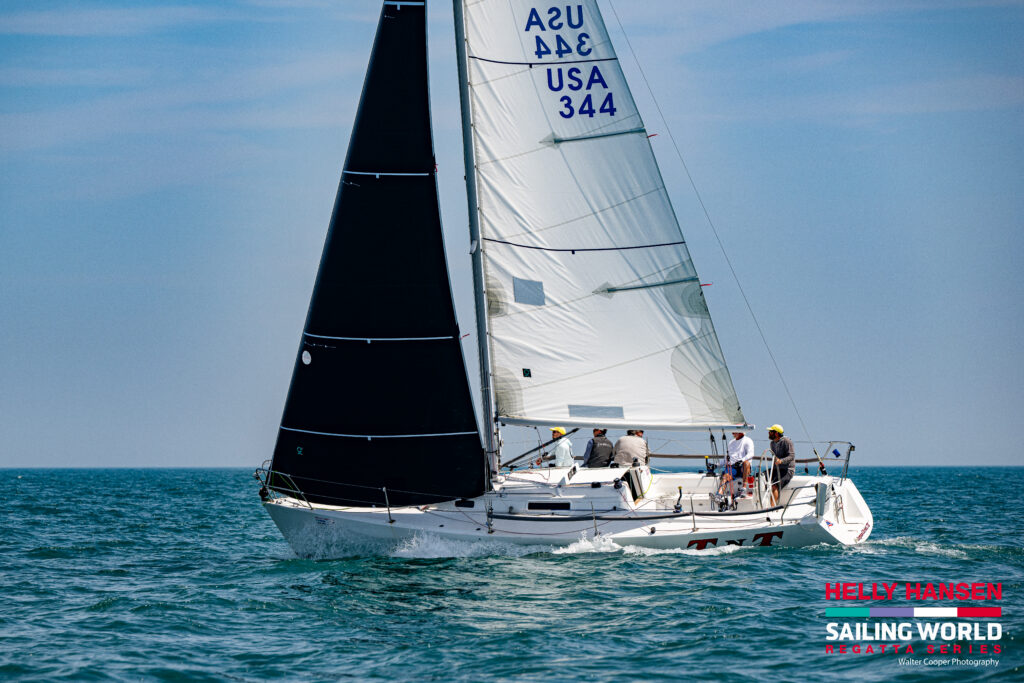 Team TnT continues to lead the J/105 fleet.
Walter Cooper
Team TnT continues to lead the J/105 fleet.
Walter Cooper
Joe Berkely and Linda Epstein won all three races in the International 110 series, and in the Rhodes 19s, Larry Ehrhardt and George Malcomson took a bite out of Nat and Jim Taylor’s overnight lead, but with a pair of seconds on the day, the Taylors are sitting on an 11-point margin.
The post Scores Compress After Race-Packed Day In Marblehead appeared first on Sailing World.
- Home
- About Us
- Write For Us / Submit Content
- Advertising And Affiliates
- Feeds And Syndication
- Contact Us
- Login
- Privacy
All Rights Reserved. Copyright , Central Coast Communications, Inc.